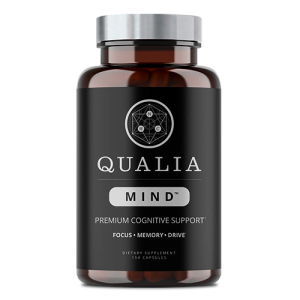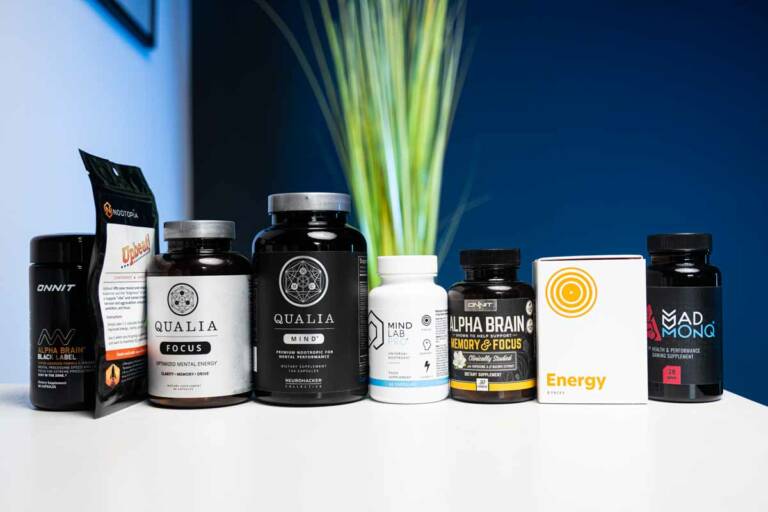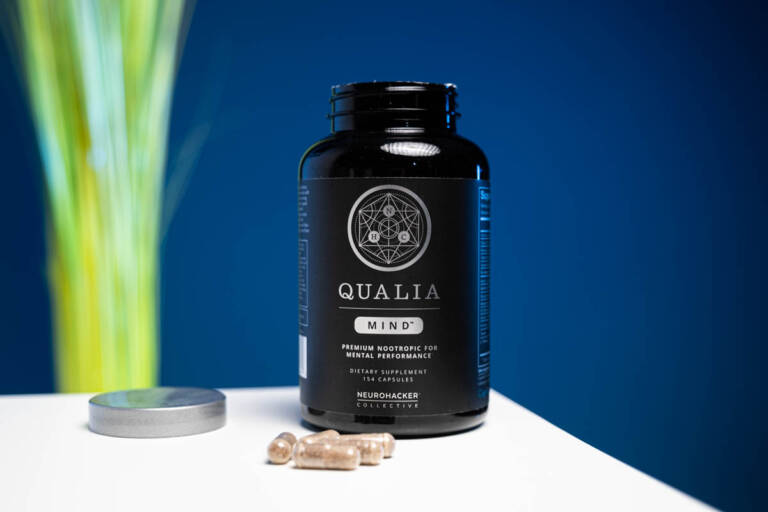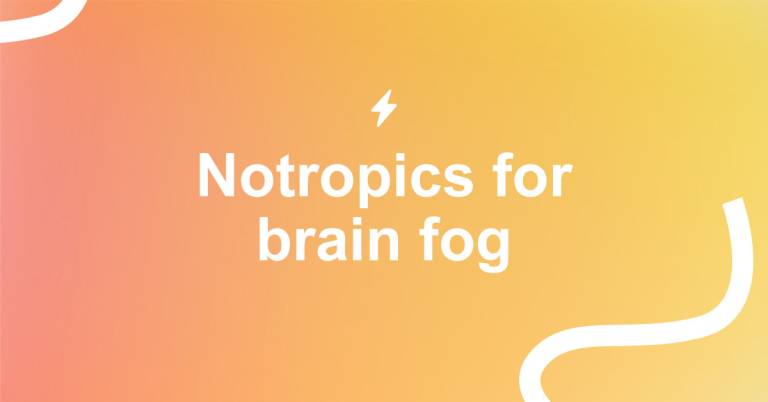Depression is a genuine and severe illness that affects a lot of people. While conventional medicine has developed a few different ways to treat depression, many people aren’t comfortable using prescription drugs, and others don’t respond well to them. That’s where nootropics for depression come in the game.
What Is Depression?
Other conventional treatment options for depression include talk therapy, counseling, cognitive-behavioral intervention, or a combination of these methods.
Alternative therapies, on the other hand, investigate and advise lifestyle changes such as diet and exercise, mindfulness techniques such as yoga, meditation or Tai chi, and non-western therapy techniques such as acupuncture, massage therapy, and guided imagery to uplift mood.
All these methods can help manage depression to varying degrees. However, some research also shows that depression can be stubbornly resistant to treatment. [1] A more natural and safer option for such individuals is to look to nootropics for treating their depressive symptoms.
Depression is a mood disorder that manifests feelings of sadness, loss, and anger to the extent that it interferes with an individual’s everyday life and activities. It is considered a severe medical condition that can escalate rapidly without proper treatment. Often, depression is referred to as both the symptom of a condition as well as a condition itself.
In terms of mood, depression can generate anger, aggressiveness, anxiousness, restlessness, and irritability. Emotional symptoms of depression can leave an individual feeling sad, empty, and hopeless, while behavioral symptoms present themselves as a loss of interest and no longer finding pleasure in preferred activities.
Depression does not limit itself to mood and emotions alone but can also affect cognitive performance. Depressed individuals will often feel an inability to concentrate and will have a difficult time completing tasks. They may also show delayed responses during conversations. [2]
On the physical front, depression can trigger fatigue, headaches, pain, and digestive issues.
Best Nootropics for Depression
#1 L-Tyrosine
This is a minor amino acid used to synthesize dopamine by the body. L-Tyrosine supports adrenal gland function, which produces epinephrine and dopamine. By elevating dopamine levels, the body reaps the benefits of boosting mental energy, enjoyment, motivation as well as appetite. Together these mechanisms can help an individual cope better with depressive episodes.
L-Tyrosine also helps balance the neurotransmitter norepinephrine, which controls mood and stress. Low norepinephrine levels accentuate physical stress and anxiety and may lead to conditions like hypotension, ADHD, and depression.
Since L-Tyrosine is essential for the absorption of norepinephrine, supplementation can help shift mood and energy, and prevent mild depressive episodes before they begin.
Dosage requirements for L-Tyrosine can vary from one person to the next. It is recommended to start with a low dosage when an individual suffers from mild depressive episodes.
Experts recommend starting with a dosage of 100 mg of L-Tyrosine. It is advised that people only take high dosages on an as-needed basis. A 100 mg dosage is enough to help with mood and energy, whereas higher doses can overstimulate the body and cause an upset stomach and nausea.
#2 Bacopa Monnieri
This is one of the most effective nootropics known for treating depression. It is an herb traditionally used for cognitive enhancement and longevity. Bacopa monnieri belongs to a category of chemicals known as adaptogens. At a chemical level, it works by blocking stress messages before they can produce a stress response in the body. Adaptogens are most effective when taken before a stressful situation occurs.
The extract from this herb can create calm, mental situations by soothing jangled nerves. The standard dosage for bacopa monnieri is 300 mg per day. As compared to other nootropics, this may seem a high number, but it doesn’t really cause any significant side effects. That said, first-time users should always monitor how their stomach reacts after taking bacopa.
Bacopa is a nootropic that tends to work slowly. This can make it easy for people to increase their dosage, thinking that it may not be working. Adding to the dosage is not recommended, as it could lead to some side effects.
#3 5-HTP
This is an amino acid and natural antidepressant produced in the body. It’s also a chemical byproduct of the essential amino acid L-Tryptophan. 5-HTP works by increasing serotonin production in the brain. Serotonin is a happy neurotransmitter that regulates mood and stress, both of which are associated with depression and anxiety.
The concern with 5-HTP and similar nootropics that increase serotonin is that you should also include others that raise dopamine levels. This is because an imbalance of either one leads to decreased efficacy and depletion of the other neurotransmitter. As such, if you solely use 5-HTP with nothing to increase dopamine levels, you can end up having insufficient dopamine and vice versa. [3]
5-HTP works well for depression when taken in doses of between 50 mg and 3000 mg a day for 2 to 4 weeks. For daily use, the recommended dose is between 30 to 500 milligrams.
#4 Ginkgo Biloba
Considered one of the top natural nootropics for depression, Ginkgo Biloba can help with depression symptoms like memory disturbances, suppressed appetite, and improving sleeping patterns. It’s also been used for treating conditions like dementia, schizophrenia, anxiety disorders, and concentration issues.
Ginkgo Biloba works by increasing blood circulation in the brain and body. Poor circulation in the brain can lead to issues like memory lapses, headaches, and difficulty concentrating, which are often seen in depressed minds.
As a general guideline, it is recommended that the Ginkgo Biloba dosage should be between 120 and 600 milligrams a day.
#5 L-Theanine
L-Theanine is a crucial ingredient of several nootropic stacks. It is sourced from green tea and induces an impression of relaxed alertness by raising Alpha brain waves. It also supports serotonin, dopamine, and GABA production, which assist with improving mood and wield a sense of controlled calm.
A 250 mg dose of L-Theanine is enough to help a person relax and improve their mood.
#6 Mucuna Pruriens
Mucuna pruriens is a natural supplement with extensive use in Ayurveda medicine. Like some other nootropics, this is also an adaptogen that modulates hormones to handle stress better. Much of its potency comes from its high L-dopa content, which is a precursor to dopamine.
By using mucuna pruriens supplements, it is possible to increase dopamine production naturally in the body. Since L-dopa can cross the blood-brain barrier, it can help the body create this feel-good positive hormone and assist with depressive symptoms.
While producing L-dopa for dopamine production, mucuna pruriens also produces its serotonin. Serotonin helps regulate mood, anxiety, and happiness, with low levels being linked to depression. As such, L-dopa derived through mucuna can be very helpful for people with nerve anxiety issues and depression.
The recommended dosage is between 200-500 mg daily, going up to 1000 mg a day.
#7 N-Acetyl Cysteine (NAC)
NAC is an amino acid that can help people who don’t respond to L-Tyrosine or 5-HTP. NAC helps regulate the amount of dopamine in the brain and also helps balance out glutamate. Glutamate is the chief inhibitory neurotransmitter, and the brain uses it to balance out the effects of other neurotransmitters. If there isn’t enough glutamate in the brain, the individual may experience severe symptoms of anxiety.
Since NAC is a nootropic that helps regulate both dopamine and glutamate, it can help alleviate a wide range of symptoms. Around 600 mg is considered a potent and safe dosage for NAC use. Some experts recommend going up to 1000 mg to prevent loss of the naturally occurring dopamine.
#8 Noopept
Noopept is a synthetic nootropic used widely for its antidepressant potential and activity. It can stimulate both dopamine and serotonin receptors that can significantly affect mood, happiness, performance levels, and anxiety.
Like some other nootropics, Noopept can also cross the blood-brain barrier and target areas of the brain involved in depression. Studies also show that Noopept provides protection for brain cells and keeps the brain healthy.
One thing to keep in mind when using this nootropic is that it can spike blood pressure. It can also cause sleep disturbances, depending on what time of the day you take it.
A regular dosage of Noopept falls within the range of 10 and 20 milligrams taken 3 times a day. Because this supplement enhances blood flow and performance of the body, it’s advised that it should not be taken late in the evening as it may prevent you from falling asleep.
#9 Kava
Kava comes from a small shrub in the South Pacific Islands and is known for uplifting mood, wellbeing, relaxation. Some studies indicate that kava can be effective for treating anxiety symptoms and restlessness, and others have shown it to help improve the quality of sleep.
For nootropic benefits, kava is used to reduce anxiety and depression. In this capacity, it can affect levels of GABA receptors in the brain. This is the calming neurotransmitter, and increasing GABA receptor sites can help manage anxiety in the brain.
Its potency comes from bioactive compounds known as kavalactones. Although it provides a calming effect on the mind after crossing the blood-brain barrier, kava has none of the sedative and impairing mental effects of benzodiazepines.
Kava extracts are made with a variety of different strands and from different source plant material, making it difficult to recommend an exact dosage. However, kava is relatively forgiving as far as dosage is concerned, and taking it 2 to 3 times a day is considered safe without causing side effects.
#10 St John’s Wort
St John’s wort is a medicinal plant that is well known to relieve mild to moderate depression while also reducing anxiety. The plant has several medicinally active compounds that can do a lot of good for the brain. But the most important are hypericin and hyperforin, which are instrumental and give the plant it’s antidepressant properties.
These compounds appear to increase the level of chemical messengers in the brain, such as serotonin, dopamine, and noradrenaline. As it does so, St John’s wort doesn’t present some of the common side effects associated with prescription antidepressants.
Studies show that St John’s wort as a nootropic for depression can reduce symptoms of mild and moderate depression more than a placebo, reduce symptoms to a similar extent as a prescription antidepressant, and present fewer side effects than prescription antidepressants.
To treat mild to moderate depression, the most common dosage used is 300 milligrams. This is taken as a standardized extract 3 times a day.
#11 Turmeric
Last but not least, turmeric possesses anti-depressant like effect that can improve depression and mental health. It contains curcumin, which has curcuminoids, responsible for the positive benefits on mental health.
Side Effects And Precautions
Taking nootropics for depression has become common practice now, but the challenge remains in identifying which nootropics to take and the possible side effects linked with them. Since depression comes in many forms, nootropics may be able to alleviate some of the symptoms by helping the brain to function normally. Most will help by allowing a person to think clearly, have more energy, and more motivation.
Anyone taking prescription medication for depression mustn’t combine their medication with nootropics. Also, we suggest you consult your doctor before supplementing any nootropics.
Best Nootropic Stack For Depression
As it currently stands, there is no single nootropic supplement that would contain all mentioned nootropics for depression.
However, this doesn’t mean there are no nootropic supplements that would help people.
Just the contrary, we suggest taking Qualia Mind, which contains many nootropics from the list (and many other ingredients and nootropic compounds).
If you want to order it, click on the button below:

Use discount code YOURINCEPTION for a 15% discount.
Types of Depression

Among the different types of depression, the following are the most common types:
1. Major depressive disorder
Also known as clinical depression, is a severe form of the condition characterized by persistent feelings of sadness, worthlessness, and hopelessness that don’t go away on their own.
2. Persistent depressive disorder
Also goes by the name of dysthymia, is a milder yet chronic form of depression. People may experience brief periods of not feeling depressed, but this relief is only temporary and lasts for two months or less before it recurs.
3. Bipolar disorder
This is best known by periods of abnormally elevated mood known as mania. These periods may be so extreme as to cause impairment within a person’s life. Extreme mania may require the individual to be hospitalized or affect their sense of reality significantly.
4. Postpartum depression
It occurs during or after pregnancy due to hormonal shifts. In contrast to ‘baby blues’ which typically last for about two weeks after giving birth, postpartum depression is longer lasting with greater severity in symptoms.
5. Premenstrual dysphoric disorder
It is a more severe form of premenstrual syndrome in which symptoms related to mood are more pronounced. Such extreme mood changes can disrupt daily life and functioning.
6. Seasonal affective disorder
Also called SAD is something that happens during wintertime when there isn’t a lot of sunlight. It is triggered by a disturbance in the circadian rhythm of the body. [4] It is more common in areas further away from the equator in far northern and southern regions of the planet.
What Does Depression Involve?

Depression involves specific brain abnormalities. Research shows that individuals with severe depression often have structural abnormalities in their brains. These abnormalities can be detected with MRI scans. Different areas of the brain show abnormal activation or metabolism in brain imaging studies. [5]
Research also points out that there may be connectivity abnormalities in neural networks that could also contribute to depression. One study found such abnormal connectivity between two brain regions, the medial prefrontal cortex, and the posterior cingulate cortex.
The former part showed having an unusually strong influence over the latter part of the brain when depressed participants thought about themselves. Participants with depression appraised themselves more negatively and excessively ruminated about themselves. [6]
Among other things, one of the causes of depression is considered an imbalance of neurotransmitters in the brain. Neurotransmitters are brain chemicals that help convey messages to and from the brain, and key players in depression involve dopamine, acetylcholine, GABA, glutamate, norepinephrine, and serotonin.
If you broadly classify neurotransmitters, you’ll see that there are two kinds; excitatory and inhibitory. The first relay information about focus, anger, and attention while the second type is associated with calm, relaxation, and tiredness. In other words, the signals sent out by neurotransmitters decide whether the brain is relaxed or stimulated, asleep or awake.
Neuronal excitation is associated with the fight or flight response that is marked by an increased heart rate, constricted vessels, enhanced focus, and alertness. On the flip side, neuronal inhibition marks the rest and digest state by decreasing heart rate, enhanced immunity, and calm and relaxed cognition.
A balanced brain supports an equilibrium between excitatory and inhibitory neurotransmitter activity. Too much of either activity can throw off the cognitive process. The same also goes for not enough excitation or inhibition.
So, how do these neurotransmitters factor into the depression equation? Let’s look at these a little closer:
- Serotonin is crucial as it helps modulate dopamine and norepinephrine. As such, regulating serotonin also helps regulate three of the five main neurotransmitter types.
- GABA is the body’s primary inhibitory neurotransmitter. Messages get regulated when they bind to GABA receptors and control neural inhibition and timing of neural networks. Therefore, anything that normalizes GABA will help.
- Dopamine is closely linked to happiness, satisfaction, reward, and pleasure. You can really boost self-esteem if dopamine levels are healthy, and higher self-esteem is a good shot at combating depression. People with sadness in their lives tend to be happier when dopamine levels are boosted.
- Glutamate is the main excitatory transmitter in the brain. Increased production of glutamate can help lower levels of depression.
- Norepinephrine has been linked to depression when levels are depleted, or messages not conveyed correctly. Regulating this neurotransmitter can ease symptoms of depression.
Among these, messages sent by serotonin, dopamine, and norepinephrine are believed to play a direct role in mood regulation. When levels fall low, it can contribute to a constant sad mood, which can become a precursor to depression.
While neurotransmitters do play a role in depression, it is also clear that these are not the only biochemical changes. There are other factors at play that complete the reality of depression. It is this connection between neurotransmitter imbalances and depression that warrants the attention of nootropics for battling depression.
Nootropics are a potent and natural alternative to anti-depressant medications. In contrast to prescription medication, which is often used to balance these neurotransmitters and whose use comes with serious drawbacks, nootropics can balance these neurotransmitters without the associated side effects.
How Does Depression Affect Cognition?

Although a mood disorder, depression can have debilitating effects on cognition as well. Some areas where this effect can be seen profoundly include the following:
1. Stress and Mood Imbalances
The first sign of depression is often a sad mood, and when stress factors in, a depressive mood becomes all the more noticeable. Such stressful scenarios can change a person’s cognitive state, particularly for those predisposed to chronic stress.
Since stress triggers the release of cortisol and sets the stress response in motion, this can hurt neuron survival and the generation of new neurons. [7] If anything, too much cortisol can mess up neurogenesis. When neurogenesis doesn’t occur naturally, it can contribute to depression.
2. Motivation
Another area that gets affected by depression is motivation. Some research even shows depression to be a motivational deficit. [8] Depressed individuals expect fewer rewarding results upon task completion and more punishing outcomes.
The primary culprit in this scenario seems to be a dopamine deficiency. This neurotransmitter impacts motivation, so when there is an imbalance, there is a lesser expectation of reward, which drives motivation down.
3. Learning and Memory
Depressed minds may also suffer from problems associated with learning and memory. The condition is believed to stymie short-term memory, in particular. It is seen to reduce the speed of information processing, which diminishes an individual’s potential to cipher and put it aside for later use. The same also reduces the capacity to grasp new information. [9]
4. Sleep issues
Troubled sleep is also an established symptom of depression. Depressed individuals often experience either insomnia or hypersomnia, which can aggravate depressive symptoms.
Sleep easily qualifies as an essential aspect of the quality of life of a person. But impaired sleep can bring about symptoms of depression. Treatment usually involves the regulation of melatonin levels. However, using nootropics for depression, along with a natural sleep aid, may help optimize cognitive capacity while also wielding a good night’s sleep.
5. Focus
A depressed mind also finds it hard to focus. In fact, anything that requires sustained attention is affected negatively by depression and creates concentration problems.
Some research indicates that gray matter in the brain shrinks in depressed populations, which may be a contributory factor. [10] But since nootropics are all about cognitive enhancement, the right ones may help depressed minds focus better.
6. Executive functioning and performance
This refers to decision making and creative thinking skills and the ability to deal with challenges. Depressed patients typically present a range of cognitive distortions and alterations in thinking style. Rumination, in particular, limits their minds to focus more on negative feelings, making them more susceptible to committing errors.
It also makes it harder to concentrate on other tasks. Depression can get in the way of these skills and affect cognition adversely. [11]
Nootropics for Depression
To understand how nootropics may help manage depressive symptoms, let’s take a quick look at the anatomy of the brain.
One part of the brain known as the hippocampus is an area that plays an important role in emotion regulation. It is also the site where different neurotransmitters are produced, including important ones like glutamate, GABA, acetylcholine, noradrenaline, and serotonin. These neurotransmitters determine mood, learning, and stress response, among other factors.
Besides, the hippocampus also plays an integral part in learning and memory and is one of the two major brain locations where neurogenesis or the creation of new brain cells takes place.
This makes the hippocampus very important for not only how an individual feels, but also their ability to acquire and retain information. Also, it has also been established that BDNF, a naturally occurring protein that is important for preventing apoptosis or cell death, growth of new neurons, and for synapse growth, is produced in the hippocampus.
Recent research shows BDNF plays an important part in depression. Studies involving patients with depression show low levels of BDNF in bipolar, manic, and depressed patients. As such, increasing levels of BDNF are seen as one way to combat depression.
As you can see, nootropics may help people with depression. Instead of buying separate nootropic compounds, we suggest buying a high-quality nootropic supplements that contains multiple effective compounds.
Here is our final recommendation.
Verdict
There is no one-size-fits-all solution for depression. Everyone’s depression is different and what works for each person will vary as well. While some people may only need to use a single nootropic to get its effects, others may need to stack to get the full effects. Plus, dosing will also be important.
For many people using nootropics to treat depression will be a journey of exploration and perhaps some trial and error. They may need to take low doses for a single nootropic or maybe stock multiple nootropics over several weeks to see which one has the best effect.
Based on our experience, we found out that Qualia Mind is one of the most effective supplements on the market that may help people with depression. To try it out, click on the button below for the lowest price possible.





